Yes, if you don’t pay attention you can easily overlook the mascot of Groenland Records. The giant ice bear watches the office from a comfortable position above the kitchen sink. He seems more chilled than frightening while the rest of its life-sized costume (the feet) is safely placed in the storage room of the Berlin-based label, just across the floor. Pop cultural history come with the bear costume, at least for those who grew up in Germany. Acclaimed video director Anton Corbijn used it in a music video for his friend Herbert Grönemeyer – aka the country’s biggest pop star and founder of Groenland – back in 2002. The title-track of his chart-topping album Mensch became a huge hit and the video itself was quite iconic as well and it’s kind of funny where the polar bear ended up. In 2019 the label celebrates its 20th anniversary and by now Grönemeyer isn’t running the label anymore but remains a crucial part of the family. He still pops by every now and then and there’s this urban legacy that Herbert himself is still attending all Berlin gigs of the Groenland artists which I can partly confirm as I once witnessed him sipping a beer at the bar during a BOY gig. “I’m like the backbone of it”, he explains, “like the reception of a hotel. Whenever I can contribute something or the label needs a bit time to breathe I’m stepping out of the background to give an important or not so important comment.”
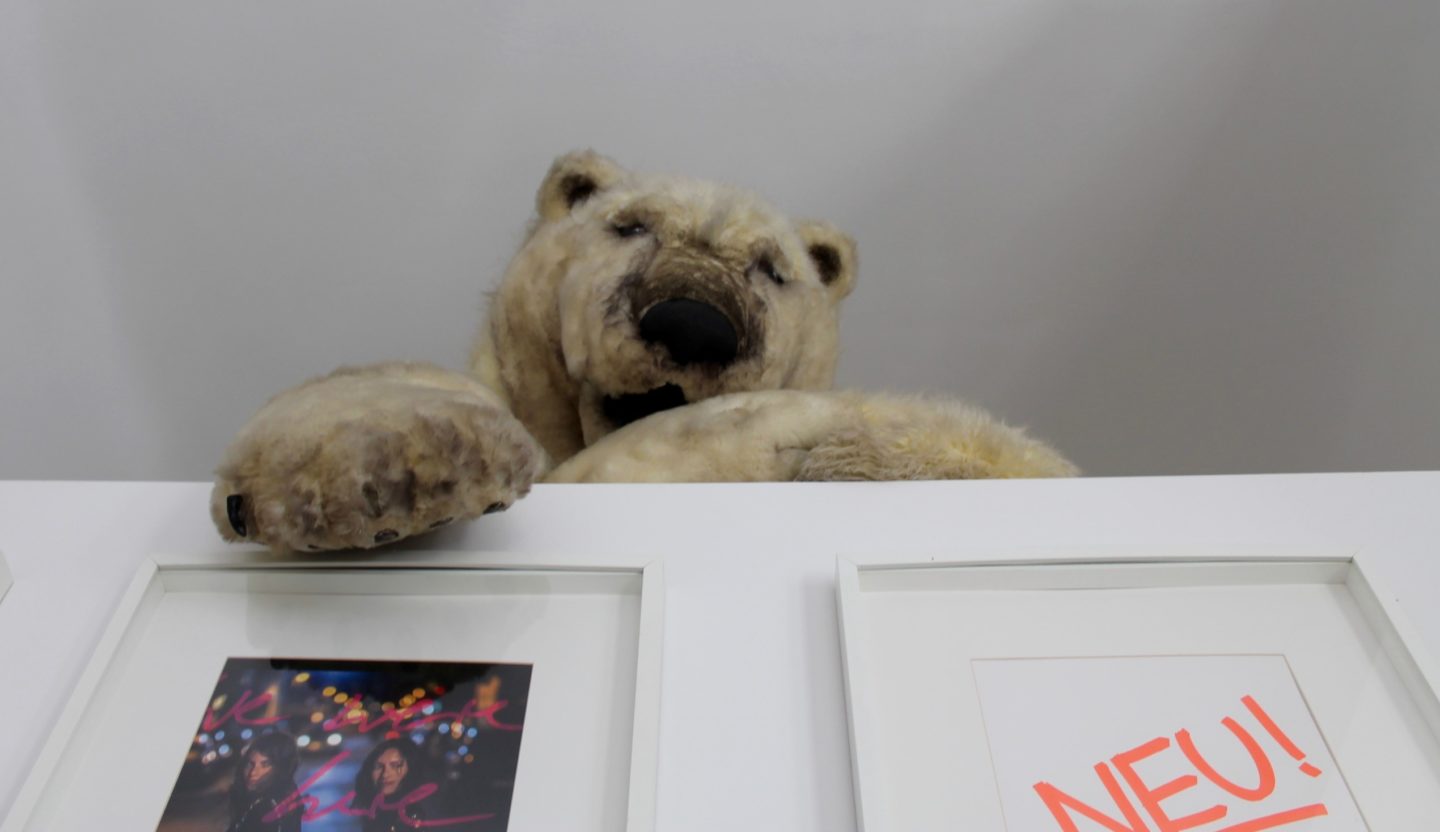
The bear is watching …
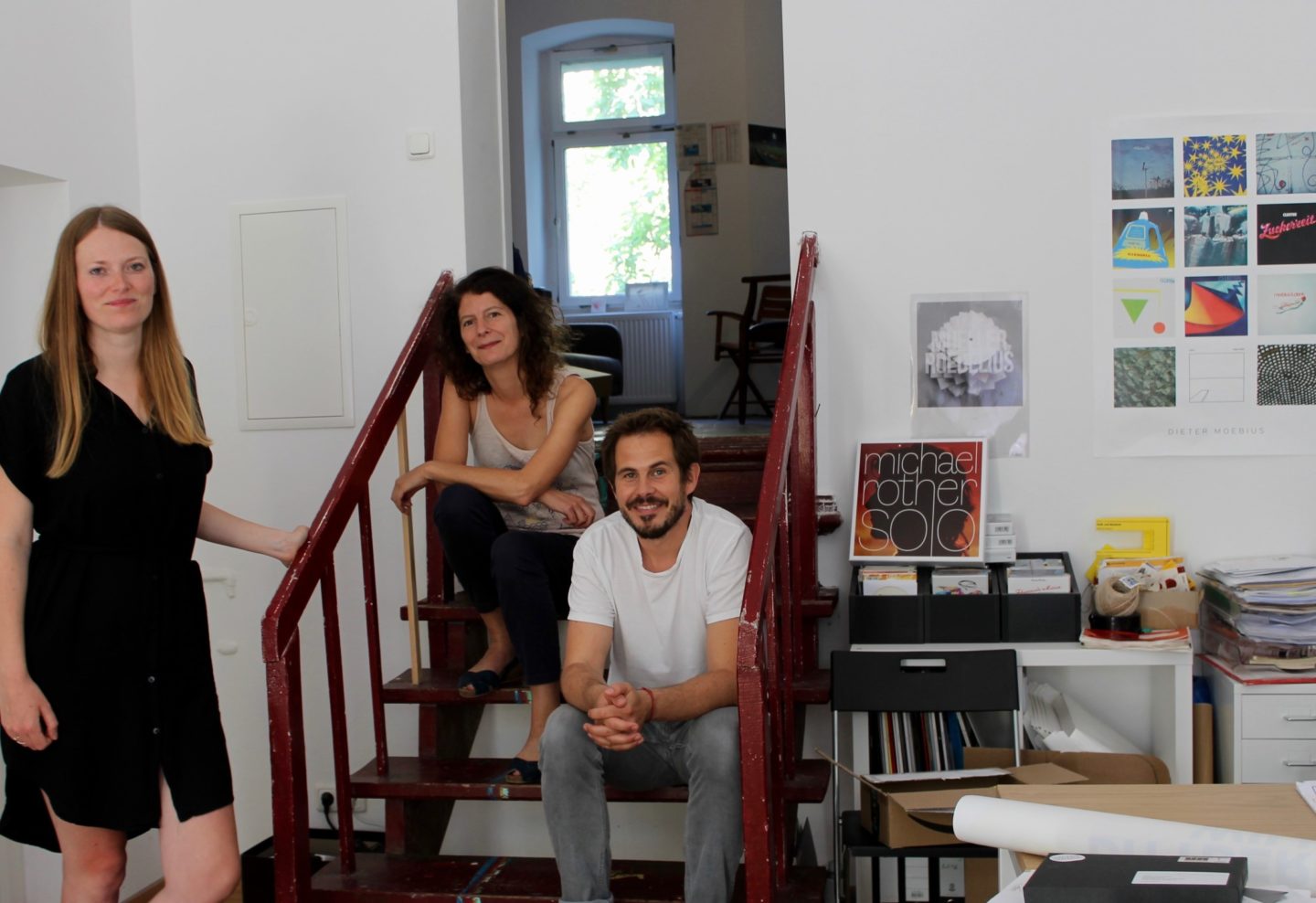
From left to right: Fine Sträter, Mareike Hettler and Lenz Hein
Lead by label managers Mareike Hettler and Lenz Hein the German independent label is now a steady force in the national music market. So I decided to pay the team a visit as well as exchanging thoughts with three of the label’s most successful artists via E-Mail – BOY, William Fitzsimmons, Krautrock icon Michael Rother and the man himself, Herbert Grönemeyer. It’s an already quite hot summer morning when we meet up for a coffee. The office is packed with boxes and posters that document the history of Groenland. Right next to the famous polar bear a cover of the iconic 1972 debut album by Krautrock band NEU! is framed. This is a fitting starting point for our walk down memory lane because this band plays a crucial part in the early days of the label. Grönemeyer founded the label back in 1999 while he was living in London, out of pure necessity as he needed a space to release Pop 2000, a compilation of iconic music. Lenz Hein – who’s been part since the early London days – remembers this moment: “Back then EMI asked Herbert whether he’d like to be their A&R segment in London. We became a German indie enclave in the heart of London.” The compilation led to a rediscovery of NEU! and Herbert was quite passionate to re-release their back catalogue which was kind of tricky as the band’s Michael Rother and Klaus Dinger weren’t in good times during that time. Rother remembers the process:
“There was a lot of bad blood between us, and we couldn’t agree on any of the offers for a re-release of our three albums. Herbert made it clear to us that his ultimate goal was to release our albums on his newly founded label. He met Klaus and me independently and tried to first understand and then find solutions for the problems in NEU!. We spent months meeting and talking, and thanks to Herbert Grönemeyer’s perseverance and determination we finally found an agreement.”
For Herbert getting Rother and Dinger back together is still one of his favourite stories of the past two decades as he explains: “This whole event encouraged me. I saw that I was able to unite two artists, especially such iconic ones who looked a bit closer on a younger fool like me and who then understood that I simply wanted to protect their work.”

Krautrock. The roots of Groenland Records
The death of the mid-sized label
After nearly one and a half years of discussion Rother, Dinger and Stephan Plank (the son of Conny Plank) signed the contract with Grönland which was the start of a new chapter for NEU!. The response to the re-released albums in 2001 was incredible and only the start of an ongoing love affair between the label and Krautrock. Especially in England there was a high demand for German music from that era, way more than in their home country. From the NEU! records they got to Rodelius and then over to Harmonia and then Lenz moved over to Berlin around ten years ago to start the Berlin office of Groenland. “It made more sense to do these German topics from Germany, rather than from London,” he explains although the beginning wasn’t that easy. “It all started with one small table in a co-working space here,” he explains. “Those times were rough and for a brief moment we thought about giving up.” Over the next years Groenland slowly but steadily emancipated itself from the Krautrock releases and started to build up something of their own. And that itself isn’t all that easy in Germany, a country where the big major labels still dominate the market. Most successful indie label stories here are connected to hip hop but apart from that it’s an ongoing struggle. Mareike Hettler explains: “All the mid-sized indie labels vanished over the course of the past twenty years. I’m not talking about the 1,2-people bedroom labels but the ones with 15 to 20 people. They are pretty much gone.” Groenland remained and slowly built up its roster, following a ‘quality over quantity’ philosophy on every level.

Valeska Steiner (left) and Sonja Glass (right) from BOY (Photo by Annett Bonkowski, taken in 2017)
“We have a really close connection to all artists,” explains Hettler this relationship. “We have the luxury to take things slower and stretch the process, for example between two album releases.” And that is something the artists worship as well. Sonja Glass of German/Swiss indie-pop duo BOY: “Currently it gives us the freedom to take our time for developing new material. And there is room for laying your focus on whatever you want, musically.” Her label colleague William Fitzsimmons confirms that to me:
“They’ve always been incredibly patient with me and my process of how I write and record and my output. I’m not really a ‘record every year’ type of artist. I have periods when I do write pretty voraciously but most of the time I need a pretty long period in between records. Groenland has never once insisted that I put something out on some kind of really strict timeline. That freedom allows me to focus on just writing things that I believe in. I never have to put something out because I ‘should’.”
Close and longterm relationships are the key to Groenland’s success and it is a conscious decision to not follow the Major label philosophy here. Lenz Hein on the changing industry: “The trend goes away from having a longterm relationship with artists. I mean even the decline of album itself is based on the idea of having more short-term solutions.” He continues: “The new possibilities don’t automatically make things easier. Many people can do the first steps on their own these days and then quite often the Major Labels swoop in and try to quickly jump on board when they sense commercial potential. We think a bit longer about whether and how we’d like to have a long-term commitment with an artist.” And that level of commitment is important – from both sides, artist and label. Songwriter William Fitzsimmons explains: “My first two releases were totally independent and the thought of working with a record label was pretty intimidating. I had songwriting friends that had been in that world already in the US and didn’t always have wonderful experiences.” But for the bearded musician the German label was pretty amazing from day one and he explains: “The actually cared about the artists and their work in a very real way.” Herbert Grönemeyer adds: “It’s not about being extremely successful with every album but the releases need to show the artist’s will for improvement.”
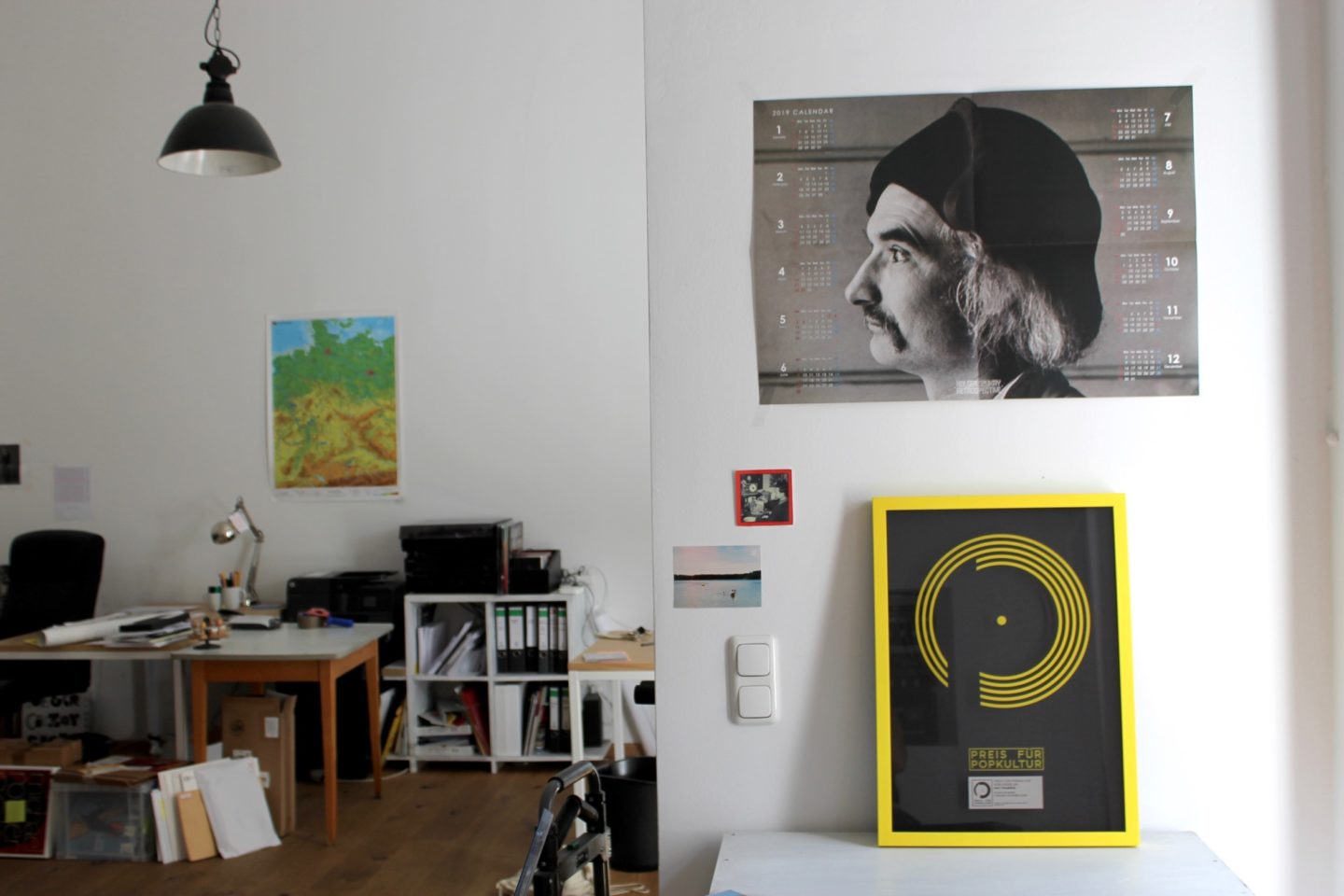
The offices of Groenland
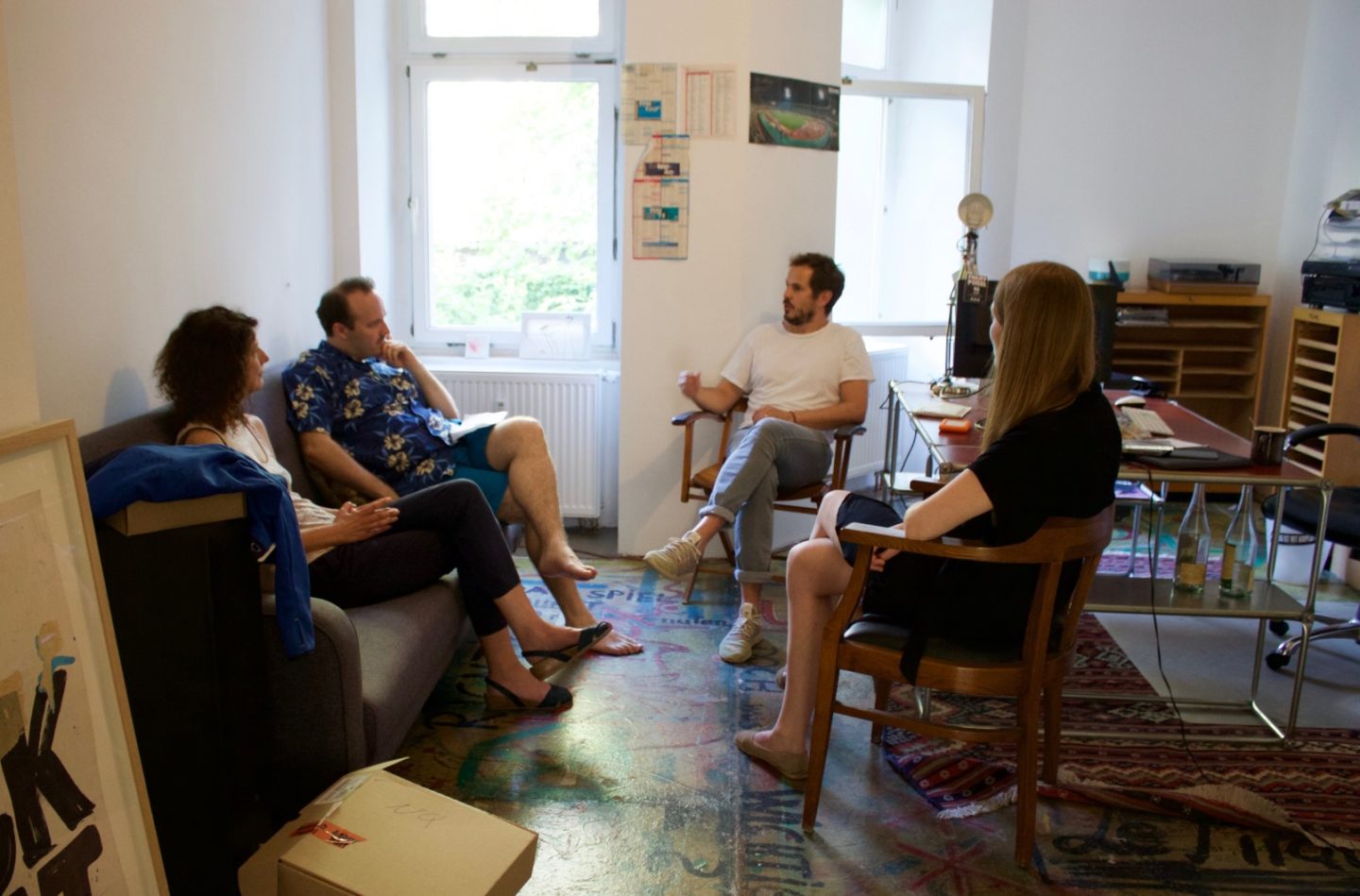
NBHAP’s Norman Fleischer in exchange with the Groenland gang
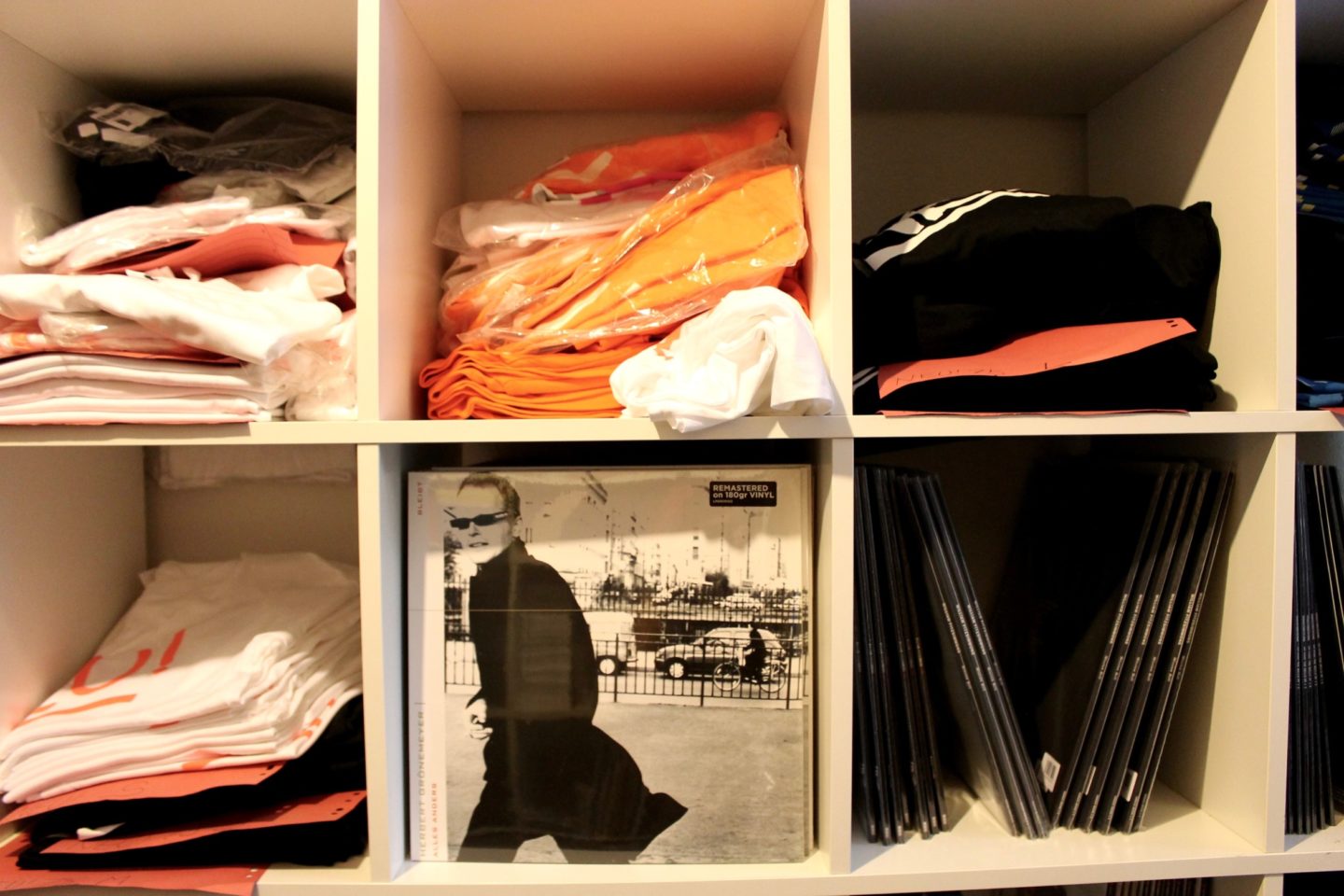
Herbert is watching …
The avoidance of growth
According to Hettler they help the artists to get their vision out in the world with team work, money, and expertise. The small and personal structure is the benefit here as Hein adds:
“When we sign deals the artists know the person on the label side. They know who they’re dealing with and with whom they’ll get through this all. It’s not about anonymously signing a contract and then have a huge production team. It’s a pretty close and direct affair. If it’s not working on a personal level it simply doesn’t make sense.”
As we exchange thoughts I clearly sense how passionate the entire team is and that they are not interested in following German’s ongoing fetish for Major label structures. They want to do it their way and they don’t want to get bigger. That avoidance of growth is a fascinating aspect we came across in our talk. Bigger isn’t always better and in the case of Groenland it is necessary to stay small. “We developed a certain kind of financial freedom, which allows us to have a really professional structure. We can support them with photographers, promoters, video directors etc.,” explains Lenz. Mareike Hettler adds: “We also keep it small by outsourcing these things. By doing that we remain flexible and we can create different teams for different subjects.” Of course, they could have hired more people but that would have forced them to increase the release rate leading to a decline of quality. “We have a direct, uncomplicated relationship with our artists. I could write them a text message right now and get in touch immediately,” says Lenz while grabbing his mobile phone. Less is more in the Groenland cosmos.
That strong bond between label and artist really spreads a certain ‘gang mentality.’ Mareike and William Fitzsimmons have become close friends over the past years as the musician explains to me: “It’s not just a working, professional relationship, it’s a true friendship. They actually care about you as a person, you’re non-musical life. They want you to be happy and healthy and don’t just look at you as a product. Mareike has been there for me in some of the most difficult times of my life as a true friend. I don’t think there’s a lot of record labels where you could find that kind of loyalty and kindness!” Michael Rother also knows about the benefits of a smaller structure: “In the past, I experienced the disadvantages you have to deal with when your music is controlled by large companies. You sometimes don’t even know the people who are working on your music and decisions take way too long.”
One of the most memorable moments of BOY member Valeska Steiner includes Lenz singing karaoke with the band back in Tokyo. She says: “We’re really happy that he joined us on so many of our tours and trips. He was there with us in countless moments that were important for us as a band.” For Lenz the huge success of BOY is still a highlight in the label’s history. “They were refused by every other label,” he remembers. “Back then many people thought that a German band singing in English wouldn’t work at all. That famous hit song ‘Little Numbers’ is actually about that. You know, the ‘seven little numbers’ are the ones of the record company that never answered their calls. Their sudden success, especially outside of Germany, was a true gift. That does not happen often.” And right now, BOY are working on their third full-length in a tempo not many labels would allow them to work at. In 2019 the roster of Groenland is packed with a variety of quality artists – Kat Frankie, Fazerdaze and Agar Agar are all of part of the family, just as well as German acts like Das Paradies, Gloria and Philipp Poisel. German indie-pop two piece Children (who we introduced you to a while ago) are the latest member signing to a label, which has a clear understanding of who they want to add to the family. “We love artists who have a strong vision on how they’d like to present themselves, how they’d like to sound,” explains Mareike. “If the ambitions are high and the talent is there, they might already have a little structure around them. That is something we always encourage.” So, if you as an artist feel like sending them an application be sure to think twice what goes with that.
“Every new deal is a commitment and it forces us to make the best out of this release and artist. We’re all in this together so we are highly motivated to make it work. The financial risk might be higher here than with a major label but it also comes with a different understanding of this relationship between artist and label. Bigger major label structures are mostly about ‘feeding the machine’ instead of thinking about what they actually want to achieve with a certain artist or release.” (Lenz Hein)
Dedicated label work, close communication, and an honest relationship between all parties are the foundation of Groenland Records‘ ongoing success. They will continue to walk their way with confident understatement and by simply doing what they do best. However, they also have to focus on the future. Especially in the 21st century the challenges a label has to face are not few. “We worship the idea of a longterm relationship. The album is surely something that’s under threat in the streaming age,” explains Lenz. “The value changes and we’re working against that but we don’t have an easy solution for it, yet.” His colleague Mareike adds: “It is an ongoing learning process.” Godfather Grönemeyer sums it up: “Maybe we didn’t blow off the roof in the past two years but due to our foundation and history we are perfectly capable of delivering wonderful art to the world.” And as long as the small team sticks to its philosophy I’m pretty convinced that they might even outlive the major label reign in Germany and will continue to release great music over the next years. Happy birthday to the polar bear and his family from all of us.
Photos by Liv Toerkell for NBHAP
On October 3 and 4 Groenland Records will celebrate its 20th anniversary with a special festival at the Festsaal Kreuzberg, including performances by plenty of artists from their roster. More information about that right here.


